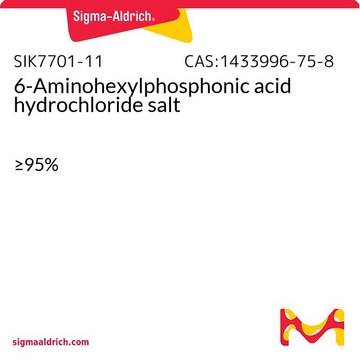A0664
4-Aminobutylphosphonic acid
≥99%
Synonyme(s) :
P-(4-aminobutyl)-phosphonic acid
About This Item
Produits recommandés
Niveau de qualité
Pureté
≥99%
Forme
powder
Couleur
white
Application(s)
detection
Chaîne SMILES
NCCCCP(O)(O)=O
InChI
1S/C4H12NO3P/c5-3-1-2-4-9(6,7)8/h1-5H2,(H2,6,7,8)
Clé InChI
IDPXFPYGZRMMKZ-UHFFFAOYSA-N
Actions biochimiques/physiologiques
Liaison
Mention d'avertissement
Warning
Mentions de danger
Conseils de prudence
Classification des risques
Eye Irrit. 2 - Skin Irrit. 2 - STOT SE 3
Organes cibles
Respiratory system
Code de la classe de stockage
11 - Combustible Solids
Classe de danger pour l'eau (WGK)
WGK 3
Point d'éclair (°F)
Not applicable
Point d'éclair (°C)
Not applicable
Équipement de protection individuelle
dust mask type N95 (US), Eyeshields, Gloves
Certificats d'analyse (COA)
Recherchez un Certificats d'analyse (COA) en saisissant le numéro de lot du produit. Les numéros de lot figurent sur l'étiquette du produit après les mots "Lot" ou "Batch".
Déjà en possession de ce produit ?
Retrouvez la documentation relative aux produits que vous avez récemment achetés dans la Bibliothèque de documents.
Les clients ont également consulté
Articles
Self-assembled monolayers (SAMs) have attracted enormous interest for a wide variety of applications in micro- and nano-technology. In this article, we compare the benefits of three different classes of SAM systems (alkylthiolates on gold.
Notre équipe de scientifiques dispose d'une expérience dans tous les secteurs de la recherche, notamment en sciences de la vie, science des matériaux, synthèse chimique, chromatographie, analyse et dans de nombreux autres domaines..
Contacter notre Service technique









